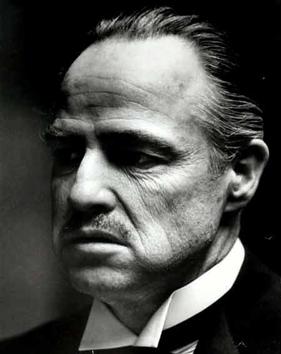W hen Don Corleone wanted to intimidate someone, he would “make them an offer that they could not refuse.”
hen Don Corleone wanted to intimidate someone, he would “make them an offer that they could not refuse.”
Taking a page from the Don’s book, when the Enron Task Force wants to intimidate a favorable defense witness from testifying in an Enron-related criminal case, the Task Force simply “informs” the witness that he or she is a co-conspirator with an Enron criminal defendant and might be indicted if they assist the defense of that defendant.
That’s certainly the impression one gets from this Mary Flood/Houston Chronicle article that reports on the Task Force’s response to the earlier motion of former key Enron executives Kenneth Lay, Jeff Skilling, and Richard Causey to dismiss the criminal case against them because of the Task Force’s misconduct in intimidating prospective defense witnesses.
The Task Force apparently gave a copy of its response to Ms. Flood before they filed it on the electronic docket of the case, so a copy of the pleading is not yet available to the general public. I will post a copy when it becomes available.
According to Ms. Flood’s review of the Task Force’s response, the Task Force concentrates on the fact that the defendants’ motion relies to a substantial degree on hearsay statements of attorneys who are representing the prospective defense witnesses who the Task Force has threatened.
Of course, the fact that the lawyers for intimidated witnesses will only disclose such threats on a confidential basis is not particularly surprising, given the risk of Task Force retribution if the lawyers were to implicate their clients publicly.
Nevertheless, it’s reasonably certain from prior testimony of two witnesses (here and here) and the Task Force’s unprecedented fingering of 114 co-conspirators in the case that witness intimidation is taking place, so U.S. District Judge Sim Lake clearly has a problem confronting him and he is struggling to figure out how to deal with it.
Ms. Flood’s article does note additional information about a documented incident of intimidation that was referred to in the Lay-Skilling-Causey motion, but much of the information was redacted in the motion.
The incident referred to in the Lay-Skilling-Causey motion involved an email from a Task Force prosecutor to a defense attorney for a cooperating government witness in one of the Enron cases that told the lawyer for the cooperating witness to direct his co-counsel to stop talking to Mr. Skilling’s lawyer or that he should “get rid” of him. The Lay-Skilling-Causey motion does not name the identity of the Task Force member who sent the email or the attorney to whom it was sent.
Ms. Flood reports that the Task Force’s response provides that information. Former Enron Task Force director Andrew Weissmann sent the email to “a Washington, D.C., area lawyer for former Enron official Ken Rice.” The docket of Mr. Rice’s case reflects that attorney to be William Dolan, but the more interesting revelation is Mr. Dolan’s co-counsel in defending Mr. Rice — i.e., Houston-based criminal defense Dan Cogdell.
H’mm, isn’t that a coincidence. Mr. Cogdell happens to be the attorney who successfully defended the only defendant in the Nigerian Barge case — former Enron accountant Sheila Kahanek — who was acquitted in the trial of that case.
Mr. Rice is the former Enron Broadband executive who testified falsely during the trial of the Enron Broadband case after copping a plea with the Task Force in the face of an almost certain conviction on insider trading charges that are unrelated to either the Broadband case or the Lay-Skilling-Causey case.
Mr. Rice — whose plea bargain allows the Task Force to withdraw its support for a light sentence if fails to “cooperate” with the Task Force in various Enron-related criminal trials — is expected to be a key prosecution witness in the upcoming trial of the Lay-Skilling-Causey case.
Accordingly, Mr. Weissmann’s email during the early stages of the Enron Broadband trial appears to be a clear attempt at least to remind — if not outright threaten — Rice’s counsel that Rice’s plea deal could be at risk unless Cogdell quit talking with Mr. Skilling’s counsel. Even more telling is that Weissman’s threatening email to Rice’s counsel was sent almost immediately after the Enron Broadband defense had caught Rice providing false testimony on behalf of the prosecution during the Enron Broadband trial.
Thus, rather than seeking the truth of whether the defendants committed crimes at Enron, the Task Force suppresses exculpatory testimony for the defendants by fingering over a hundred alleged co-conspirators, threatens defense witnesses, and threatens a cooperating witness with breach of his plea bargain if his counsel even chats with defense counsel for Mr. Skilling.
Does anyone really believe that Messrs. Lay, Skilling and Causey — already facing a highly anti-Enron environment that the prosecution has helped fuel — can receive a fair trial under these circumstances? And is this really the way that we want our Justice Department to be operating?

Pingback: Over-Reaching Prosecutors Run The Country - Big League Politics